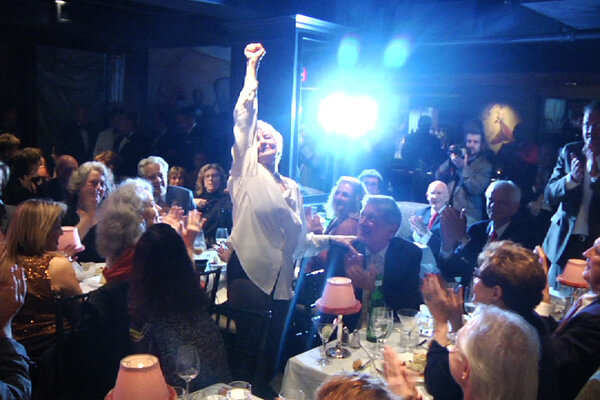Maryann Plunkett, Roberta Maxwell, Amy Warren, and Jay O. Sanders in “Women of a Certain Age,” the third in Richard Nelson’s trilogy “The Gabriels: Election Year in the Life of One Family,” at the Public Theater through December 4. | JOAN MARCUS
As I watched events unfold on Election Night, among my many concerns was how the results would affect the Gabriel family. In talking with friends and fans of Richard Nelson’s trilogy, “The Gabriels: Election Year in the Life of One Family,” I realized I was not alone.
Nelson’s artistry is such that the characters he created over the course of the first two plays had become so real we had developed an intimacy with them analogous to our relationship with real people for whom we care deeply. The Gabriels are a family in crisis, one writ small in the slow erosion of their lives. Financial troubles, the decline of a parent, the loss of a spouse, and the challenges of living in a culture that seems to have passed them by are all woven into the quotidian process of making a meal and passing the day. The effect is a level of immediacy seldom achieved in the theater, with characters richly yet economically drawn. It’s like sitting in the corner of the kitchen, an empathetic, if invisible, guest, rather than an audience member at a play.
The third play in the trilogy, “Women of a Certain Age,” picks up where the last play left off, though several months have passed. It is Election Night. The results are not yet in, but whichever way it goes life is about to change irrevocably for the Gabriels. The matriarch’s bad financial decision means their home has been sold out from under them, and the kitchen where they have gathered for all three plays is about to vanish. Only with controlled anxiety and acceptance does the family struggle on. That’s about all there is to it, but it is in the absence of plot and the depth of characters, beautifully accomplished with Nelson’s direction and a superlative cast, that the play achieves its gripping, understated power. The brilliance of the trilogy comes in offering an emotional touchstone for the cultural disquiet audience members know surrounds them outside the theater.
Two contemporary plays and one classic add up to three outstanding evenings
Nelson’s deceptively effortless direction grounds the family in real relationships and behaviors, and, as in the other two, the cast is magnificent. Mary Ann Plunkett, Roberta Maxwell, Jay O. Sanders, Lynn Hawley, Amy Warren, and Meg Gibson are a dream ensemble who bring the Gabriels to life from the moment the lights go up. This is doubly compelling because not much happens in the play. Well, except life. I was emotionally drained at the end of the second play, though not so much at the end of this one, which is both intentional and welcome. There is no closure, but we know that the Gabriels will go on — one way or another. Sometimes, that’s the best we can hope for.
Johanna Day and Michelle Wilson in Lynn Nottage’s “Sweat,” directed by Kate Whoriskey, at the Public Theater through December 18. | JOAN MARCUS
Lynn Nottage’s “Sweat,” also at the Public, is in many ways a companion to the Gabriel plays in that it, too, deals with real people in real life. Based on the playwright’s research into real lives in Reading, Pennsylvania, destroyed by the closing of the plant where families had worked for generations, it is a clear-eyed look at the economic and social forces that in the early years of the century set up the seething anger that led to Donald Trump’s victory.
Nottage’s characters lack education, but have a sense of entitlement, a fear of change, and resentment-fueled anger, yet they are also sympathetic, largely because their tragedy results from their recognition they have become economically disposable. With grim and harrowing lyricism, Nottage beautifully evokes the corrosive effect this realization has on their identities and communities.
The play takes place in a bar, as the plant is closing, its operations moving to Mexico. A stable, middle class built up over three generations crumbles, and as the characters try to make sense of it all, racial tensions and violence ensue. Is healing possible? As in the real world, the answer is unknown.
Under Kate Whoriskey’s direction, the play throbs with tension from the beginning. John Lee Beatty’s set beautifully evokes the down-at-its-heals bar, and Peter Kaczorowski’s lighting is appropriately sharp-edged. The cast is uniformly excellent, notably Johanna Day as Tracey, whose life is shattered when she doesn’t get a promotion and then loses her job when the workers are locked out of the factory. Tracey is a force to reckoned with, not just as a finely drawn character but also as a symbol of the conflict and despair engulfing the community. Michelle Wilson as Cynthia is a black woman who had worked side-by-side with Tracey until getting a promotion to management, which makes her the object of Tracey’s rage. Wilson gives a tremendous performance of impressive range.
Nottage’s incisive eye and brilliant narrative structure ultimately convey the message that we ignore people like Cynthia and Tracey at our peril. Of course, as we now know, we have, and it may be too late.
John Slattery and Nathan Lane in the revival of Ben Hecht and Charles Macarthur’s 1928 “The Front Page,” directed by Jack O’Brien, at the Broadhurst through January 29. | JULIETA CERVANTES
“The Front Page” is a rollicking, screwball comedy in the classic tradition that seeks to do nothing but entertain. If it reminds you of the profit-driven sensationalism of today’s media, well, that’s probably a sign of how prescient this nearly century-old play was.
The lavish production, thanks in large measure to Douglas W. Schmidt’s fantastic set, now at the Broadhurst may also remind you of a time when producers could afford to have a cast of more than 25 and the world they could create with that.
The play is set in a newsroom as a convicted murderer is about to be executed. Hardly the stuff of contemporary comedy, yet through a series of twists and turns, the killer escapes and mayhem ensures. There’s also a subplot as ace reporter Hildy Johnson is about to leave the news business for an upwardly mobile marriage and a cushy job in PR.
The set-ups are obvious, but Ben Hecht and Charles Macarthur’s 1928 play is full of such rapid-fire repartee and outrageous characters that it doesn’t matter. Under Jack O’Brien’s sure-handed direction, the breakneck speed and slapstick comedy are consistently entertaining.
The cast features all kinds of Broadway royalty — Jefferson Mays, John Goodman, Holland Taylor, Sherie Rene Scott, Dylan Baker, and Robert Morse — all of whom are at the top of their comic games. Then there’s Nathan Lane as Walter Burns, the hardnosed publisher dedicated to nothing but scooping up profits, and John Slattery as Hildy. They are a flawless comedy team, playing perfectly off one another and, like the rest of the cast, seeming to have a marvelous time. As are we.
WOMEN OF A CERTAIN AGE | Public Theatre, 425 Lafayette St., btwn. E. Fourth St. & Astor Pl. | Through Dec. 4: Tue.-Sun. at 7:30 p.m.; Wed., Sat.-Sun. at 2 p.m. | $65-$100 at publictheater.org or 212-967-7555; $20 lottery tickets at todaytix.com | One hr., 45 mins., no intermission
SWEAT | Public Theatre, 425 Lafayette St., btwn. E. Fourth St. & Astor Pl. | Through Dec. 18: Tue.-Sun. at 7 p.m.; Wed., Sat.-Sun. at 1:30 p.m. | $65-$100 at publictheater.org or 212-967-7555; $20 lottery tickets at todaytix.com | Two hrs., 30 mins., with intermission
THE FRONT PAGE | Broadhurst Theatre, 235 W. 44th St. | Through Jan. 29: Tue., Thu. at 7 p.m.; Wed., Fri.-Sat. at 8 p.m.; Wed., Sat. at 2 p.m.; Sun. at 3 p.m. | $67-$167 at telecharge.com or 212-239-6200 | Two hrs., 45 mins., with intermission






































